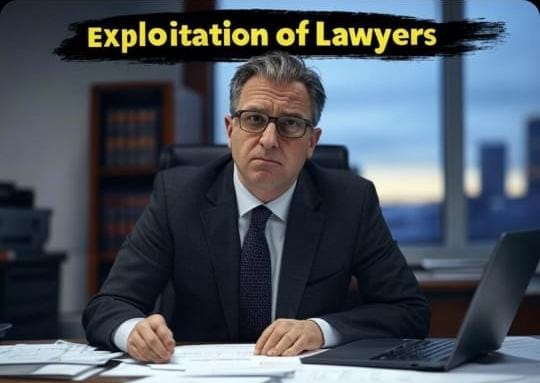The legal profession in India has long been revered for its role in upholding justice and maintaining the rule of law. However, beneath this esteemed facade lies a troubling reality: the exploitation of junior lawyers and law students under the guise of ‘juniorship’ and internship.’ The practice concerned not only undermines the dignity of budding legal professionals but also poses significant ethical and legal concerns. Here’s how.
The Conventional Practice of Juniorship in the Legal Profession
It simply refers to the period during which newly graduated law students or recently enrolled advocates work under the mentorship of senior lawyers. This apprenticeship is intended to provide practical training, courtroom exposure, and an understanding of legal procedures. Traditionally, it has been viewed as an essential and non-negotiable phase for skill development amongst aspiring litigators.
Systematic Disclosure of the Problem
Imagine being a fresh law graduate with a deep passion for litigation. You find yourself interning under senior advocates who represent some of the best legal minds. But soon, the façade begins to fade — the reality is harsh. You are expected to perform demanding tasks, spend long hours in court and chambers, and often juggle personal finances, all while receiving little to no compensation. To add up, the monetary remuneration offered is comparable to, or even lower than, that of Grade IV government employees.
Let’s examine the problem more closely — not from the top, but from the eyes of the fresh graduate or newly enrolled advocate.
First, the structural design of legal education itself has evolved in a way that imposes greater burdens on students. The now-prevalent five-year integrated law course replaces the traditional three-year program that followed a prior undergraduate degree. This means students commit more years, more money, and more effort to become legal professionals — all under the assumption that this path ensures professional readiness. Unlike many general undergraduate degrees, law is a professional qualification, which means that graduates are presumed “practice-ready” upon completing their course.
Second, the economic reality of pursuing law has shifted. Legal education — particularly from private law schools — is becoming increasingly expensive.
But the bitter truth being, that unless one graduates from a top-tier NLU, the access to lucrative law firm jobs or elite chambers is severely limited. For the majority — those from lesser-known institutes or tier-2 and tier-3 law schools — the journey into litigation begins not with opportunity, but with systemic exploitation.
The transition from student to practitioner is increasingly defined by unpaid work, vague promises of “exposure,” and the silent normalization of labour without pay. Moreover, the juniors are often expected to fund their own transportation, wear expensive professional attire, and remain available round the clock.
The Reality of Exploitation
While the concept of juniorship is rooted in noble intentions, its implementation often deviates from its original purpose. The exploitation manifests in various forms:
- Unpaid Labor: Junior lawyers are frequently expected to work without any stipend, making it challenging for them to sustain themselves, especially those from economically disadvantaged backgrounds.
Lack of Formal Contracts: The absence of formal agreements between seniors and juniors leads to ambiguous roles, undefined responsibilities, and no clear terms of engagement.
Overburdening with Work: Juniors are often assigned tasks beyond their capacity and experience, without adequate guidance or support.
Limited Learning Opportunities: Instead of receiving structured mentorship, many juniors end up performing clerical tasks, hindering their professional development.
Ethical-Legal Implications
The exploitation of junior lawyers brings to light numerous legal and ethical issues. To name a few, these include non-existence of principles of fair labour practices, employment without contracts among many others.
The Bar Council of India urges to maintain the dignity and integrity of the profession. While exploiting juniors contradicts these ethical standards, it also tarnishes the profession’s reputation and also discourages budding under-graduates from entering the mainstream litigation, which is a serious concern.
Judicial Intervention and Recommendations
The Madras High Court, in June 2024, prudently and notably addressed the exploitation of junior lawyers.
A Division Bench of Justices S.M. Subramaniam and C. Kumarappan observed that not paying even a “minimum stipend” to junior lawyers amounts to exploitation and violates their fundamental rights. In addition, the court boldly stated that extracting work without payment is a direct violation of constitutional rights and hence directed the Bar Council of Tamil-Nadu and Puducherry to formulate guidelines to ensure fair compensation for junior lawyers.
Former Chief Justice of India D.Y. Chandrachud, in July 2024, also criticized the “paternalistic approach” towards junior lawyers and advocated for dignified compensation. He starkly remarks that paying meager amounts to juniors leads to ‘gatekeeping’ of the profession and called for the provision of fair remuneration commensurate with their hard work.
Assessing the Role of Bar Councils and Legal Associations
The BCI & Bar Councils are the statutory bodies and they play a pivotal role in safeguarding the interests of legal professionals. It is imperative for these bodies to establish, firstly, minimum stipend guidelines; secondly, pave the way for an environment where enforcing formal agreements on the basis of role & pay is normalised; thirdly, monitor and address grievances expediently followed by promoting ethical mentorship.
Final Remarks
The exploitation of junior lawyers under the pretext of juniorship is a pressing issue. One has to realise that it is these lawyers who are then encouraged to practice unethically often in a way that is borderline similar to professional misconduct. The effects could be disastrous for the clients they deal with. No wonder it is incumbent upon senior lawyers, judicial bodies, Bar Councils, and the juniors themselves to collaboratively foster an environment that upholds dignity, fairness, and professional integrity.
About Author

Tanishq, a law student at the Department of Legal Studies and Research, Barkatullah Vishwavidyalaya, Bhopal, is a budding legal writer with a sharp eye for evolving legal landscapes. Passionate about Intellectual Property Rights, Constitutional Law, and Women and Child Safety Laws, Tanishq actively explores contemporary legal nuances through writing and research.

